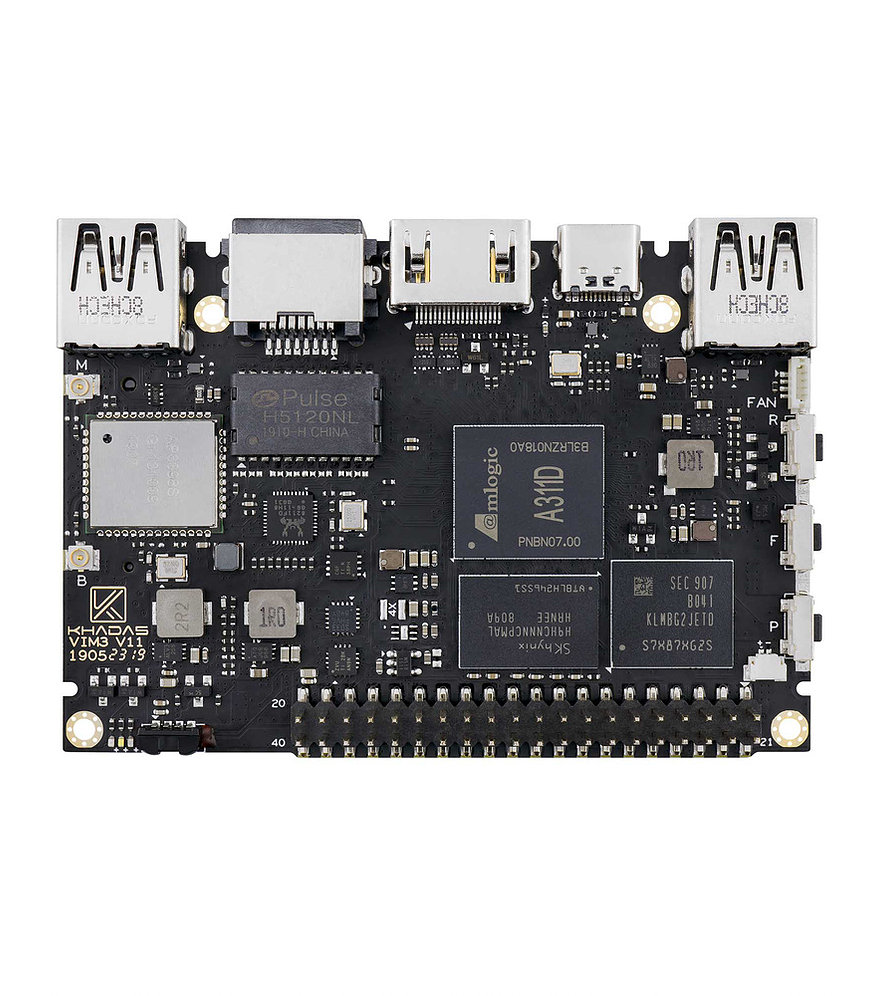Khadas Introduces VIM3 Raspberry Pi Competitor Line With Two Launch Configurations
Get Tom's Hardware's best news and in-depth reviews, straight to your inbox.
You are now subscribed
Your newsletter sign-up was successful
If you're the type to dabble with Raspberry Pi, but wish there were alternatives to muck about with, you may be in luck. A new alternative to the diminutive computer is available via Khadas: the VIM3, which comes in both Basic and Pro versions priced at $99 and $139 respectively. Khadas, which manufactures single-board computers (SBCs) similar to that of the Raspberry Pi itself, has both models of its VIM3 lineup of SBCs available for purchase now, with shipping scheduled for mid-August.
Initially, Khadas is offering the boards in two configurations, with additional options and more powerful versions coming at a later date. The Khadas VIM3 Basic comes rocking 16FB eMMC Flash and 2GB LPDDR4 RAM, and it's $99. The Khadas VIM3 Pro doubles the storage and RAM on board for just $139.99.
The VIM3 uses an Amlogic S992X system on a chip. It's the very same, in fact, as the one the Odroid-N2 uses, which includes four Cortex-A73 performance cores, a Mali-G52 Mp4 GPU, and two Cortex-A53 efficiency cores. You can use your VIM3 to code 4K 10bit video at 75 fps, if you so choose. Khadas will let you utilize Android Pie, LibreElec, and Ubuntu XFCE 18.04 in terms of available OS options you can use.
Keep in mind that neither will come with a USB-C adapter or cable and you may have to pick up additional accessories depending on which model you choose. But if you're looking to go down a different DIY avenue in terms of experimenting, Raspberry Pi-style, these Khadas SBCs look like an interesting starting point.
Why would you want one of these over a Raspberry Pi? Well, the Khadas VIM3 includes USB 3.0 support, the aforementioned 4K output, and a few other features that the Pi models prior to the new Raspberry Pi 4, have not. However, a Pi (including the new Raspberry Pi 4, if you can find it), is cheaper, so there's your trade-off.
If you're interested in picking them up, lock in your pre-order now, as these prices have gone up from the initial production batch's pricing of $69.99 and $99.99 and it's possible they could raise further in the future.
Get Tom's Hardware's best news and in-depth reviews, straight to your inbox.
-
bit_user ReplyWhy would you want one of these over a Raspberry Pi?
Because its A73 core are faster and clocked higher than the Pi 4's A72 cores and its GPU is more powerful.
The real question is why you'd want this over an ODROID-N2. That, I don't (yet) know. -
farnell121 Replyadmin said:If you're the type to dabble with Raspberry Pi, but wish there were alternatives to muck about with, you may be in luck.
I don't know if you are just learning about Single Board Computers, but there has been multitudes of solid, durability tested products since the original Pi has been introduced. Most people don't care about how fast a SBC's GPU is because 9 times out of 10 there are ZERO hardware accelerated drivers, and you can tell that to my Odroid-XU4, Le Potato and Banana Pi based boards.
In the ARM SBC world, never boast about the GPU capabilities unless you know for a fact hardware accelerated drivers exist under Linux, otherwise the user is limited to just multimedia-oriented distros lacking a Linux desktop. -
farnell121 Replybit_user said:Because its A73 core are faster and clocked higher than the Pi 4's A72 cores and its GPU is more powerful.
The real question is why you'd want this over an ODROID-N2. That, I don't (yet) know.
I see most of these kind of articles from Tom's Hardware in my news feed, and a lot of it makes me upset because I know for a fact the article writer hasn't tested the hardware, just quoting specs.
On paper and real-world are two very different things.
Please see my previous quote but I agree, the Odroid-N2 comes from a very established brand (HardKernel) with excellent community support, and at the price with specs, it is no contest to go Odroid-N2. If you are new or even intermediate to SBC's, most people will want to go with a product with a strong community so you don't end up with paperweights waiting two years down the road for a stable image.
I bought a Banana Pi M2-Zero and it was about a year and a half before I got a working image that didn't overheat, and there's still no hardware GPU acceleration.
